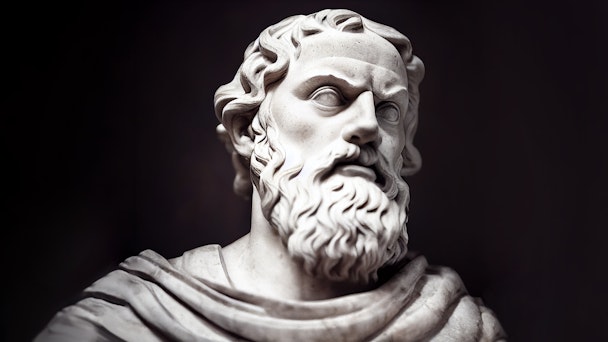At SXSW, themes of AI, mythmaking and the future of humanity collide
What do Plato, Joseph Campbell and the Terminator films have in common? They’ve all contributed to the evolution of how human beings understand themselves through stories – and they’re all being discussed in Austin right now.

In the 4th century BC, Plato warned humanity that we often mistake illusions for reality. / Adobe Stock
I don’t know exactly what I was expecting from the first panel that I attended at SXSW this year, but it wasn’t a lecture on Plato.
The panel – held on Monday and titled ’AI and the Future of Truth’ – was introduced with some remarks from Brent Reidy, the Andrew W Mellon director of the research libraries at the New York Public Library, about the famous Greek philosopher and what’s almost certainly his best-known work, the ’Allegory of the Cave’ from Republic (circa 380 BC).
The allegory essentially makes the claim that what we take to be reality is, in fact, a deceptive play of artifice and imagination. In the story, human beings are chained deep inside a cave where no light from the outside world is able to penetrate. They’re facing a wall, and behind them burns a giant fire so that all they’re able to see in front of them are the shadows and plays of light cast by the shifting flames. The hapless prisoners mistake these shadows and projections for reality, Plato writes. He likens this to the state of all human beings, who take mere illusions of truth to be reality, and urges us all to break out of our chains, make the painful passage out of the cave and adjust our eyes to the sunny world outside if we are ever to experience true reality.
The story has been told and retold over the ages, most recently in Hollywood; The Matrix is a good example, as is The Truman Show and Don’t Worry Darling – all play with the theme that we’re living in a manufactured world that we mistake for reality. And Plato’s words, Reidy warned, could be more relevant today than ever before, as AI threatens to blur the boundary between reality and fiction to an unprecedented, perhaps unfixable degree. “What we are now stepping towards is a future in which large language models and their hallucinations might be the brightest flame behind us,” he said.
That brief but impactful discussion of Plato foreshadowed a theme that I’ve been encountering over and over during my time at SXSW this year: the power of storytelling – and, more specifically, the need for new and more human-oriented stories around AI.
The following day, I attended a keynote session from filmmakers Daniel Kwan and Daniel Scheinert, jointly known as ’The Daniels,’ who attained superstardom last year when their film Everything Everywhere All at Once won a number of Oscars, including Best Picture. (It also, incidentally, premiered at SXSW two years ago.)
During their presentation, which focused on how and why they made the film and was attended by more people than I had ever seen gathered into a single room at SXSW, The Daniels described storytelling as a foundational, essential part of human beings.
At one point, they played a clip from Joseph Campbell and the Power of Myth – a 1988 docuseries hosted by the journalist Bill Moyers – in which Campbell described the need for human beings in the future to create a myth that encapsulates the whole of humanity and planet Earth. This, Kwan said, was a major inspiration leading to Everything Everywhere All at Once.
Kwan wrapped up the talk with a few comments on AI and its potential impacts on the film industry, which he described as both undeniable and alarming. “I’m really terrified of this new story,” he said.
Hearing talk of both Plato and Joseph Campbell within my first two days at SXSW suggested to me that stories, mythmaking and (at the risk of being melodramatic) the existential condition of humankind was very much on people’s minds at the conference this year, and that such concerns were being sparked primarily by the rapid development of AI.
To learn more, I sat down yesterday with Ian Beacraft, chief executive officer of design agency Signal and Cypher, who also describes himself on LinkedIn as a ”futurist.” He told me that, in his view, we’re currently living through a historical and anxiety-inducing moment in which, by developing increasingly powerful AI, we are potentially handing over the keys to our civilization to more intelligent entities.
“The idea of ceding power to a more powerful species is literally the definition of an existential crisis,” Beacraft says, “and we’re having that collectively right now.”
The key to finding our path forward in the Brave New World of AI, according to Beacraft (and here he begins to echo Joseph Campbell), will be to create new stories – stories that don’t paint AI as something to fear, as we’ve been accustomed to seeing in films like The Matrix and Terminator, but rather as a tool that can help humanity break out of its illusions and build a more harmonious and sustainable future. Stories, he says, can help us navigate the road ahead.
“Stories are the most valuable tool that we have – we build society off of them,” he told me. “And that’s what we need in order for people to understand how this change is going to take place.”
For more on the latest happenings in AI, web3 and other cutting-edge technologies, sign up for The Emerging Tech Briefing newsletter.

